
Alby Hailes knows better than most how important it is to look after yourself.
Not just because he is a doctor and has been working in the field of mental health, but because he too nearly fell into the "burnout" trap.
A doer by nature, Hailes thrives on being busy — like working 60-hour-plus weeks as a psychiatry registrar and writing and photographing a cookbook in his "spare time" — when he noticed some physical health problems.
"Last year was very hectic."
He went to a general practitioner, something he had not done in eight years, who suggested burnout and stress were contributing to his problems.
"I took two weeks off to re-evaluate."
It led to some important reflection on the direction his life was going. He had spent six years at medical school at the University of Otago and worked as a doctor for four years while also taking part in The Great Kiwi Bake Off in 2021.
"I’d done all that without taking a significant step back and when you throw everything else in, it’s not that sustainable."
He and his partner quit their jobs, decided to sell their house in Whangarei and move south again as his partner wanted to study public health in Dunedin.
"My parents live out in Waitati so it’s nice to be close to them for a little bit."
Hailes decided it was time to take things a bit easy for a while. The couple have moved into the central city and instead of taking a permanent job, he has been working as a locum for one week a month around the country.
"It’s the first time I’ve lived almost in the city centre where you can walk to everywhere and it’s cool that it’s just a five-minute walk and you’re in the Octagon."
That has given him plenty of time to focus on his new cook book and cake order business.
"I like being very busy and I miss that. I’m using this year as an opportunity to reassess my goals for myself and I think I’ll launch back into things. It’s about finding the balance and I think I have better idea about how I can do that in the future."
He hopes to return to psychiatry and finish his qualification as he believes there is a lot to do in the mental health and food area, especially in the areas of food security and the impact of nutrition on mental health.
"I think if I’m to return to doctoring full-time now, while also doing some of this on the side, I’d have better boundaries. Working in the mental health space is quite challenging and you really take home with you a lot of what is going on. I was starting to become quite cynical about the world and it was bringing down how I was feeling about myself as well.
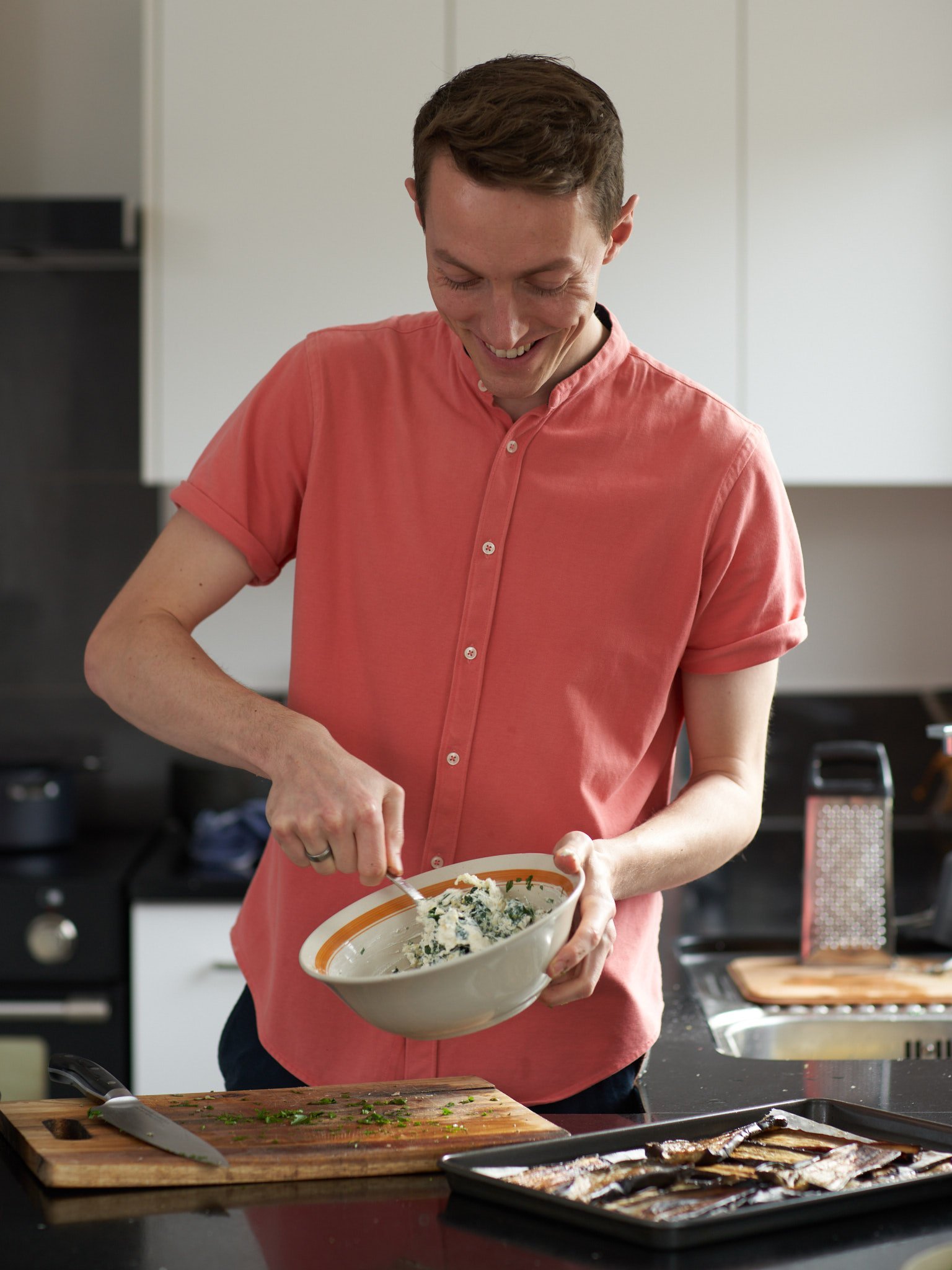
Hailes has been working on his cookbook for years as he slowly built up a range of recipes. After winning Bake Off — something he entered to get him out of his comfort zone — he sent off an email to all the publishers he could think of with a proposal for a "fully realised" cookbook.
He was riding high on adrenaline from the high-intensity three-week TV shoot and while he went straight back to his "day job" after his win, he knew he wanted to do more in food.
"I’ve always been very passionate about food."
Growing up with a mum who was an "amazing" cook and a dad "who wasn’t too bad either", he always loved flicking through cookbooks. At university, he self-published Scarfie Kitchen, which he describes as a "very different beast".
"There is something really beautiful about a book — there is no replacement for it. It’s not the same scrolling the internet, you’re tangibly holding a cookbook and getting butter all over it."
It has always been his goal to walk into a book shop and see a book of his on the shelves.
"To see something you’ve made and others can enjoy and it can be part of their kitchen and family. I think that’s something to be proud of ."
Hailes admits to being a messy cook — just think back to his benches on Bake Off, he says.
"I always had the messiest of aprons. Now since moving here we have a very small kitchen compared to the past so it necessitates being a bit tidier."
An important part of his ethos around food, which he hopes comes through in the book, is the importance of having a positive relationship with food.
"I’m very anti a lot of these restrictive fad diets that have come through in the past five or 10 years which can result in a really negative relationship between your mind your body and the food you are eating."
While there are good reasons to change a person’s diet, such as reducing gluten intake if you have coeliac disease or turning to plant-based diets due to environmental concerns, he believes the ideal way of eating is when people can connect to the whenua, where their food comes from if possible, cooking your own food and to do it with others.
"Food is so powerful at creating human connection — every celebration or sadness food is part of that and has been through history. [It’s] part of a healthy life, especially in our work-centric society. It’s so important to connect with people through food and having fun in the kitchen, challenging yourself to have more fun with flavours and thinking about the personal benefits through the cooking process can be a very mindful thing.
"The kinetic feeling of kneading dough or tuning in to the smells and tastes. There is lot to be gained from food. "
Hence the title of his book — Good Vibes — with the tagline "eat well with feel good flavours". It is broken up into chapters such as energise, delight, thrive, comfort and connect.
"It’s a combination of globally inspired ingredients. There is a lot of fusion food to push people to try different food and flavours but in an accessible way with positivity.
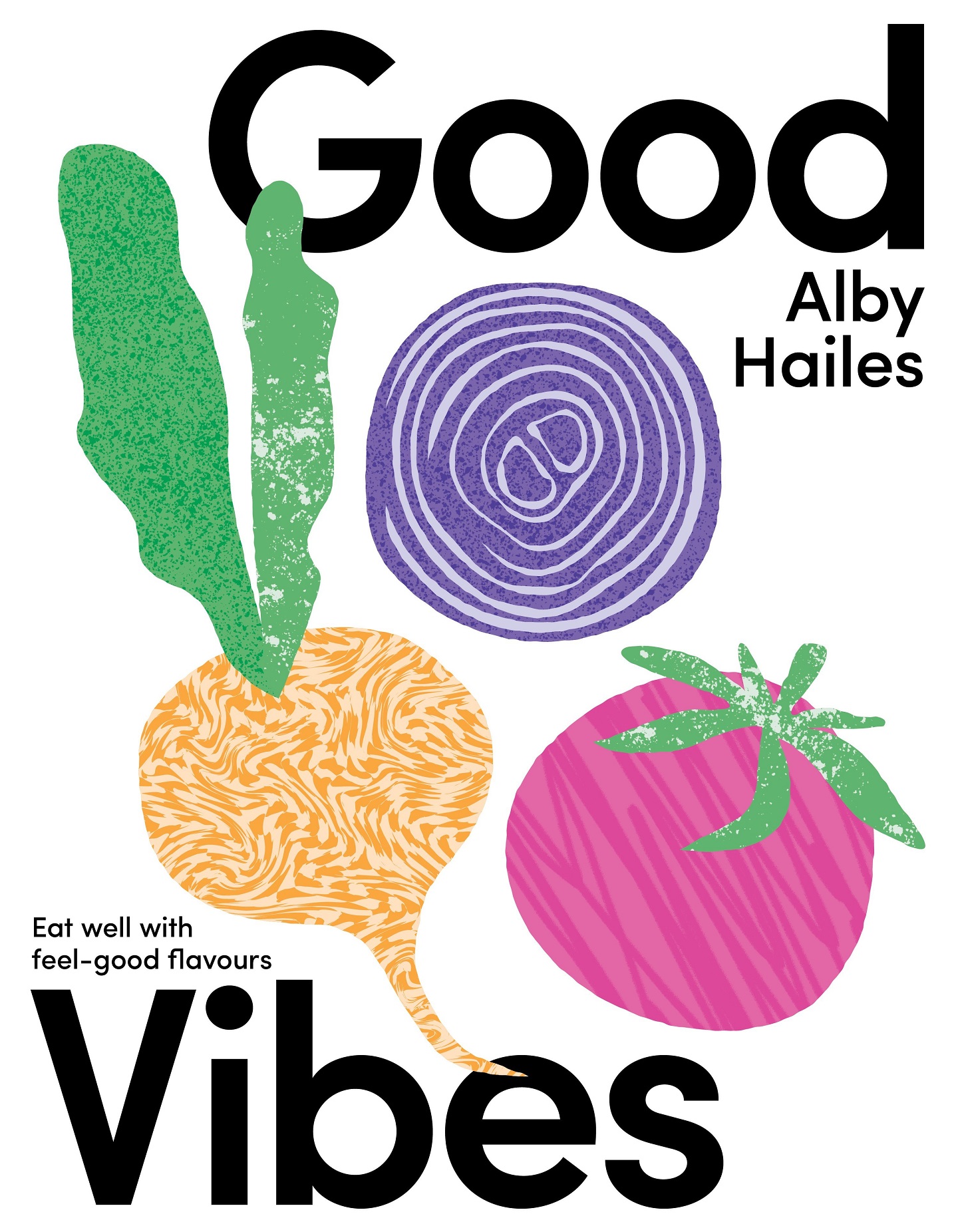
The recipes are all ones he has made many times for himself or for others. They are recipes that might have come together from throwing a few things together in the kitchen to "see what happens" to others where he has pored over cookbooks from his favourite food writers to see how they approached a dish and then put his "own spin" on it using different flavours and techniques.
"Food is such a big part of our history, a completely original concept or recipe is pretty hard to come by. There are some pretty amazing things being done in the cheffing world but when you are making more home-cooked food it still has to have a degree of familiarity.
"That’s what my recipes try to do — something that is still familiar but is something different. Even something as basic as the lasagne recipe, where it’s blitzing beetroot into the bechamel sauce which makes it super yummy but is something you might not think of doing. "
Overall he enjoyed the process of publishing the book and believes it represents him "relatively" well. He is planning a publicity tour around the country after its release this week and a launch party in Dunedin on Friday.
"It’s slightly left-field from the typical cookbook you see in New Zealand and the cover is different. I’m excited to see how it goes and how New Zealanders respond to it."
With the cookbook in production, Hailes has been working on his cake business when not working as a locum. He had originally thought he would start a food business but could not find the right fit and location. Instead he decided to make cakes to order from his home kitchen.
"It allows me the flexibility to still go off and do doctoring work and food writing."
When people order a cake they can also choose an organisation for another cake to be donated to free.
"There’s a bit of sharing the love with it which is always good."
Cake is something you can be very creative with on the decorating side but also in the flavours, he says.
"People will see that in the delight, or dessert section of my book too. There isn’t an ordinary plain chocolate cake in there. I think the exciting thing about cooking is figuring out how you can incorporate savoury flavours into sweet and vice-versa especially with herbs and spices.
"The opportunity to be creative with food is endless and at the end of the day you get to share the deliciousness with others."
THE BOOK
Recipes extracted from Good Vibes by Alby Hailes (HarperCollins NZ, HB, RRP $55)
Photography: Aaron McLean
TO SEE:
Good Vibes launch party, author talk 6pm, food inspired by the book, music, Heritage Coffee Dunedin, Friday.
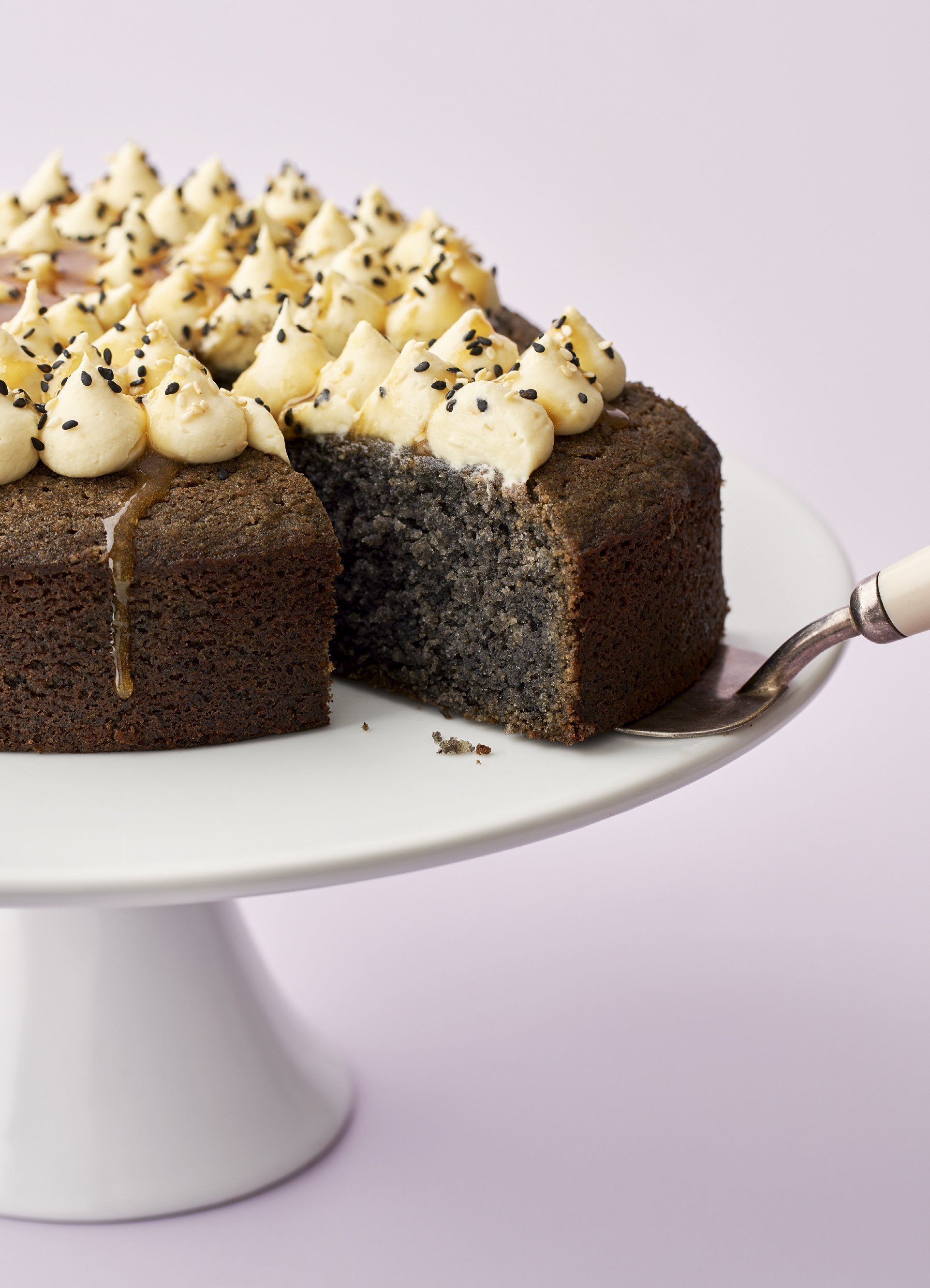 Black sesame, rose and cardamom cake with honey mascarpone icing
Black sesame, rose and cardamom cake with honey mascarpone icing

If there is a quintessentially me cake, this is it. This cake has fed hungry hospital nurses, been cut by a married couple, and even featured as the base for one of my showstoppers on The Great Kiwi Bake Off. I love how visually striking the grey tones of the crumb are against the whipped cloud-like mascarpone. The combination of black sesame, rose, cardamom and black pepper is an unusual one, and it’s sure to become a favourite.
Serves 12
Prep 20min
Total time 1hr30min
Cake batter
100g butter, softened to room temperature
200g caster sugar
2 eggs
125ml canola oil
2 Tbsp rose water
2 tsp vanilla extract
75g black tahini
125ml coconut cream
150g plain flour
110g ground almonds
2 tsp baking powder
1 tsp ground cardamom
¼ tsp sea salt
¼ tsp ground black pepper
To decorate
1 Tbsp white sesame seeds
1 Tbsp black sesame seeds
200g mascarpone
1 ½ Tbsp honey, plus extra to drizzle
2 tsp rose water
Preheat the oven to 160°C fan-forced (or 180°C conventional). Grease a 20cm round cake tin and line with baking paper.
To make the cake, beat the butter and sugar in a large bowl, using an electric hand or stand mixer with the paddle attachment, for 3 minutes or until pale and fluffy. Add the eggs and beat for 1 minute, until well combined. Pour in the oil, rose water and vanilla. Beat for 1 minute, until smooth. Add the black tahini and coconut cream and beat for an additional minute, until smooth. In a separate bowl, whisk together the flour, ground almonds, baking powder, cardamom, salt and pepper.
Fold the dry ingredients into the wet until smooth and just combined.
There should be no remaining specks of flour left in the cake batter.
Pour into the cake tin and bake for 45-50 minutes, or until a skewer inserted into the centre of the cake comes out clean. Leave to cool in the tin for 15 minutes before turning on to a wire rack to cool completely.
To decorate, toast the sesame seeds in a small frying pan over medium heat for a few minutes, until starting to brown and pop. Transfer to a small bowl to cool. In a separate bowl, whisk together the mascarpone, honey and rose water until smooth. Pipe or spread the honey mascarpone evenly over the top of the cooled cake, then sprinkle with the toasted seeds and drizzle with extra honey.
Serve on the day of baking, or refrigerate in an airtight container for up to 4 days. Bring to room temperature before serving.
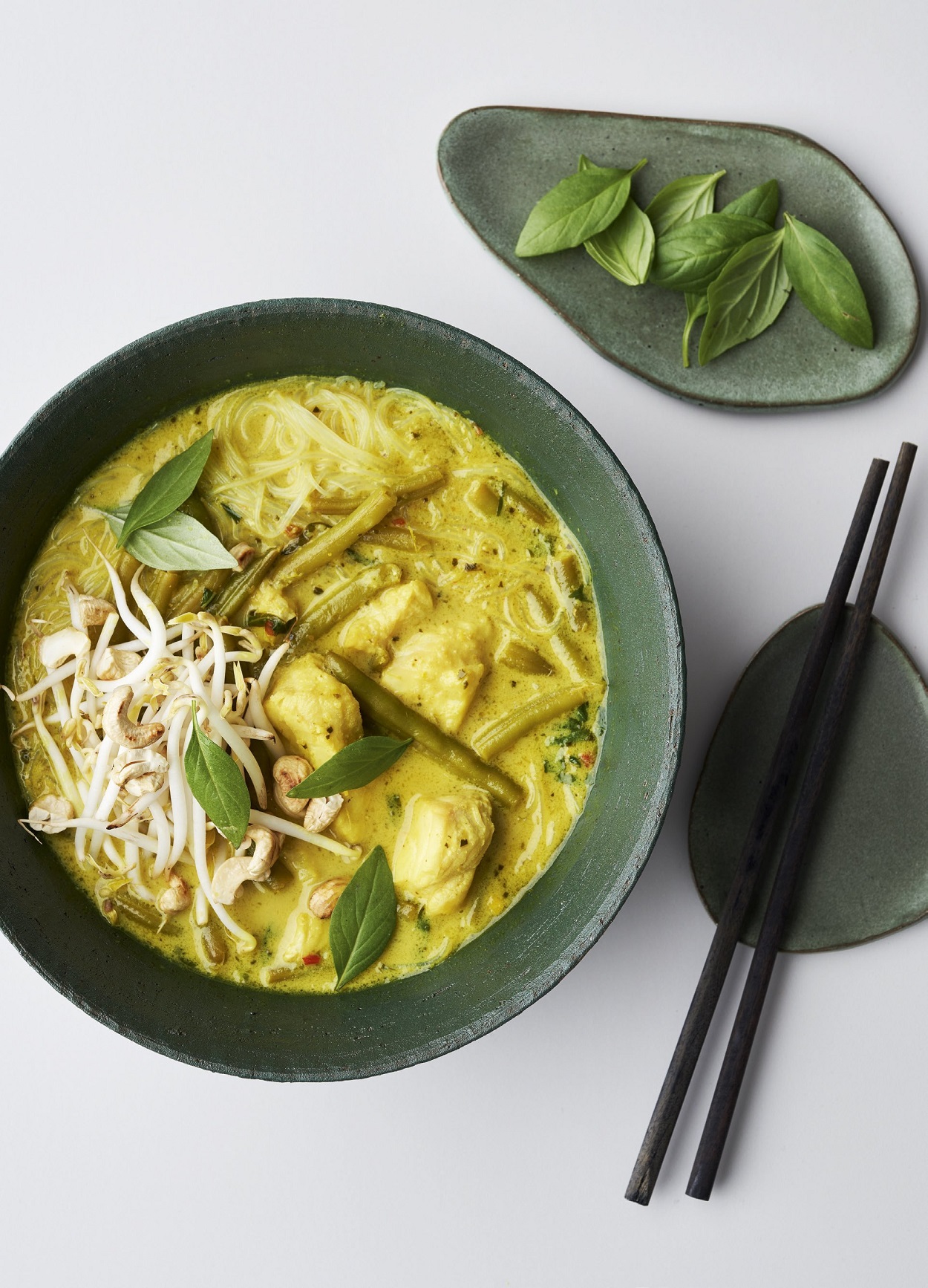 Monkfish laksa with Thai basil and curry leaves
Monkfish laksa with Thai basil and curry leaves

Tamarind, lemongrass and kaffir lime form the basis for this slurpingly good noodle soup, featured in Good Vibes by Alby Hailes. It hits you first with the aromas of citrus, Thai basil and curry. Then comes the coconut broth, rich with fish sauce umami, warming chilli and ginger.
Serves 4
Prep 30min
Total time 45min
Laksa paste
75g cashews
4 kaffir lime leaves, shredded
4 cloves garlic, finely chopped
3 shallots, finely chopped
2 stalks lemongrass, tough outer layers removed, ends trimmed and chopped
2 red chillies, finely chopped
3 Tbsp chopped Thai basil
2 Tbsp fish sauce
1 Tbsp finely grated fresh ginger
1 Tbsp caster sugar
1 Tbsp tamarind paste
1 tsp each ground coriander and ground turmeric
½ tsp cracked black pepper
Finely grated zest and freshly squeezed juice of 1 lime
Additional ingredients
3 Tbsp coconut oil
1 litre vegetable stock
400ml can coconut cream
2 Tbsp fish sauce
20 curry leaves
500g monkfish fillets (or any firm white-fleshed fish), chopped into 3cm chunks
250g green beans, ends trimmed and halved
1 Tbsp soft brown sugar
1 tsp sea salt
1 large handful Thai basil leaves, roughly chopped, plus extra to serve
200g rice vermicelli noodles
Mung bean sprouts, to serve
Method
First make the laksa paste. Toast the cashews in a frying pan over medium heat for a few minutes, tossing occasionally, until golden brown. Roughly chop half the cashews and set aside. Transfer the other half of the cashews and remaining laksa paste ingredients to a blender or food processor and blitz to form a relatively smooth paste.
To cook the laksa, heat the coconut oil in a medium-large saucepan over medium heat. Add the laksa paste and fry for 5 minutes, until deeply fragrant and starting to brown. Stir in the stock, coconut cream, fish sauce and curry leaves. Increase heat to high to bring to the boil, then reduce to medium and simmer for 15 minutes. Add the monkfish, green beans, brown sugar and salt. Increase the heat to medium-high and simmer for a further 4 minutes, until the fish is just cooked through and the beans are tender-crisp. Remove from the heat, stir through the lime juice and basil and adjust seasoning to taste.
As the laksa is simmering, prepare the noodles. Place the vermicelli noodles in a large heatproof bowl, pour over boiling water to cover and leave to soften for 5 minutes. Drain, refresh under cold water, and drain again.
To serve, divide the noodles evenly among four bowls. Ladle over the laksa and top with a handful of mung bean sprouts, the reserved cashews, and extra basil.Sumac yoghurt chicken with orange tabbouleh and green olive hummus
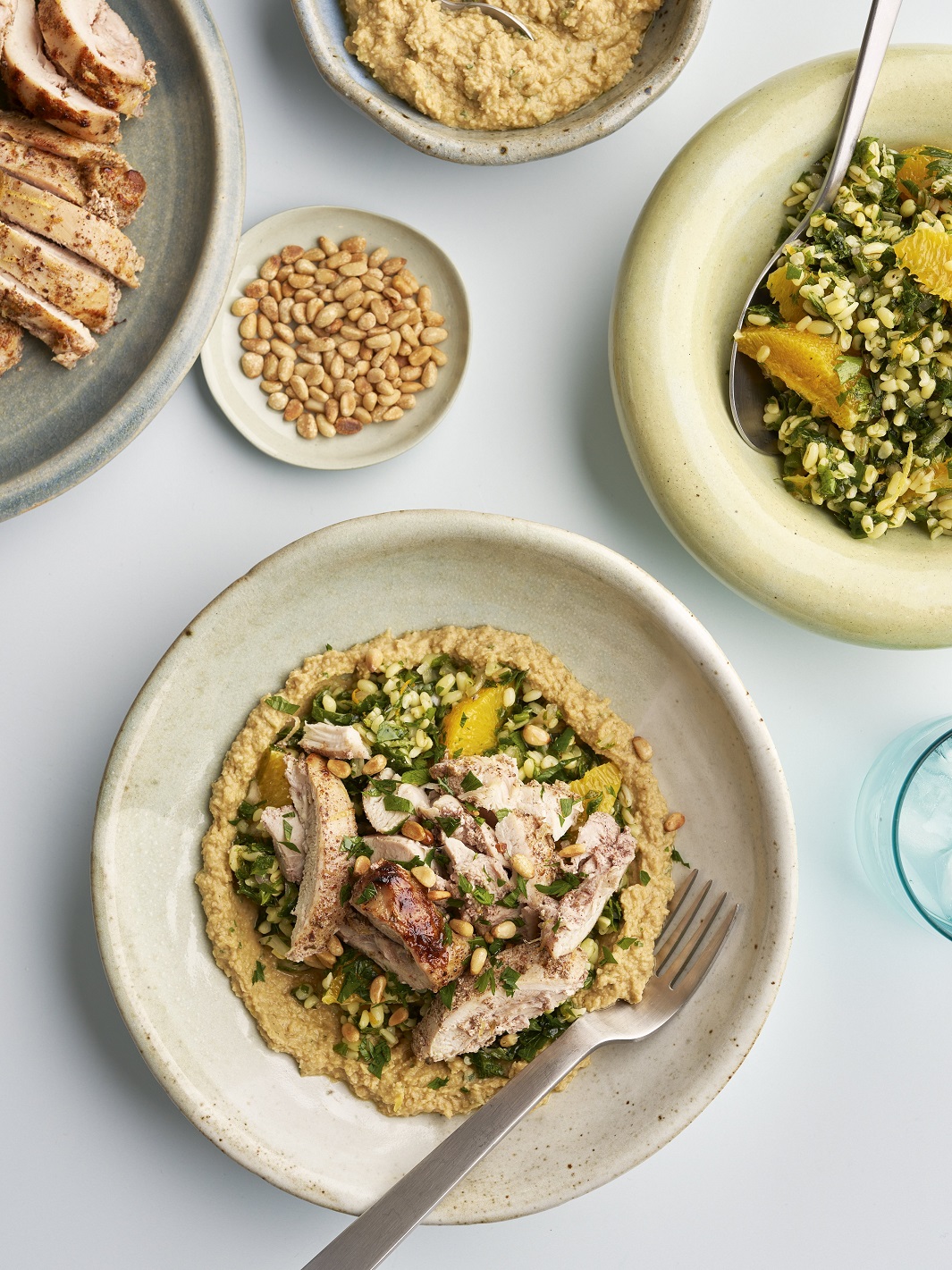 Sumac yoghurt chicken with orange tabbouleh and green olive hummus
Sumac yoghurt chicken with orange tabbouleh and green olive hummus

This recipe, extracted from Good Vibes by Alby Hailes, combines elements that are excellent together but versatile on their own. Oranges bring a jewel-like quality to the tabbouleh and lend it sweetness.
Serves 4
Prep 30min
Total time 50min (+ overnight)
Sumac yoghurt chicken
280g unsweetened natural yoghurt
4 Tbsp olive oil
1 Tbsp finely chopped fresh oregano
1 Tbsp ground sumac
½ tsp ground cinnamon
½ tsp ground allspice
½ tsp ground chilli
½ tsp cracked black pepper
1 tsp sea salt
2 cloves garlic, finely chopped
Finely grated zest and freshly squeezed juice of 1 lemon
1kg boneless chicken thigh fillets, fat trimmed
Green olive hummus
400g can chickpeas, rinsed and drained
Freshly squeezed juice of ½ lemon
12 green pitted olives
2 cloves garlic, finely chopped
4 Tbsp olive oil
2 Tbsp tahini
1 Tbsp finely chopped flat-leaf parsley
1 tsp honey
½ tsp sea salt
½ tsp cracked black pepper
Orange tabbouleh
100g fine or medium bulgur wheat
1 extra-large bunch (100g) flatleaf parsley, leaves picked, plus extra to serve
20g mint leaves
1 spring onion, finely chopped
1 shallot, finely chopped
Finely grated zest and freshly squeezed juice of 1 lemon
85ml olive oil
½ tsp sea salt
½ tsp cracked black pepper
2 large oranges
Additional ingredients
2 Tbsp pine nuts
1 large handful flat-leaf parsley leaves, roughly chopped
Method
Marinate the sumac yoghurt chicken in advance. Place all the ingredients, except the chicken, in a large bowl and mix to combine.
Add the chicken and toss through the marinade to coat. Refrigerate for at least 3 hours (or overnight). Remove the chicken from the fridge 30 minutes before cooking.
Preheat the oven to 170°C fan-forced (or 190°C conventional). Line a large roasting dish with baking paper. Transfer the chicken and marinade to the roasting dish and bake for 35 minutes, until the chicken is cooked through.
While the chicken is cooking, make the orange tabbouleh. If using fine bulgur, place in a fine sieve and rinse under cold water several times until the water runs reasonably clear. Drain, transfer to a bowl and fluff up with a fork. If using medium bulgur, place in a bowl, cover with boiling water and soak for 10-15 minutes until tender but still firm to the bite. Drain and fluff up with a fork. Finely chop the parsley and mint leaves and add to the bulgur wheat, along with the spring onion, shallot, lemon zest and juice, olive oil, salt and pepper. Finely grate the zest of one orange and add to the tabbouleh. Cut the skin and white pith off the oranges, then cut out the segments, discarding the inner pith and membranes. Toss the segments through the tabbouleh and set aside.
For the green olive hummus, place all the ingredients and 4 Tbsp cold water in a food processor or blender and blitz until smooth.
To finish the chicken, turn the oven to the grill function and grill the chicken for 5-10 minutes, until starting to brown a little on top. Set aside for 5 minutes then transfer the chicken to a chopping board and slice.
To serve, toast the pine nuts in a small frying pan over medium heat, until golden brown. Serve the chicken warm with the orange tabbouleh, green olive hummus, toasted pine nuts and some extra chopped parsley.













